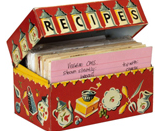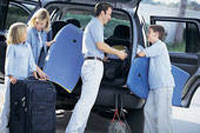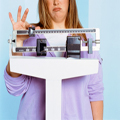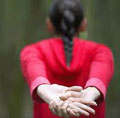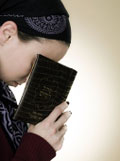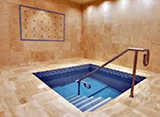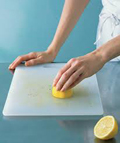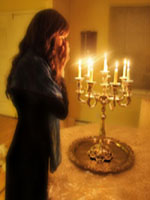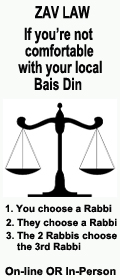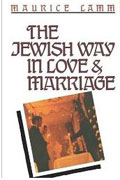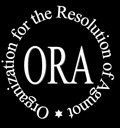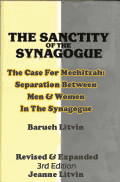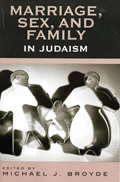Q & A
SHABBAS
PAGE 3
♦♦♦♦♦
A burglar was found in our building on Shabbat afternoon.
We stopped him & asked for identification which he didn't have.
As it turned out after the confrontation, he pulled a knife & was on drugs.
Should we have immediatly called the police?
- One is not allowed to break Shabbat by telephoning just in order to save one's money or property from being stolen.
- However, when there exists even the slightest chance that the burglar could become violent then one is obligated to do everything possible to save oneself or others
- Therefore just finding a person in the building without identification does not seem to justify calling the police, unless one suspects he will likely go to another building & endanger lives there.
- If however he pulls a knife, or it is obvious from his actions that he may become violent.(for example a person acting deranged because of drug use who may suddenly attack children), one should call the police.
- The burglar may also be detained, if this is possible without danger, until the police arrive
(See Shmirat Shabbat KeHilchatah chap. 41, 25-29).
♦♦♦♦♦
I didn't realize that I had a wallet in my pant's pocket until I got to shul.
I was very upset, but I didn’t know what to do.
I left it in my pocket, continued praying, but made sure that I didn’t touch it.
What should I have done?
- In such a situation the correct thing to do is to shake the wallet out of one's pocket & leave it where it falls, because it's mukzah.
- However, there are several reasons to refrain from doing so that are applicable in your
situation:
1. You may suffer a loss if the wallet is left where it drops if someone else takes it,
2. You may be embarrassed to do so in your shul
3. It may be impractical to shake out the wallet from your pocket without first undressing &
removing your pants, which is of course unacceptable in public. - Therefore you should leave the wallet in your pocket, without using that pocket at all, until
the first practical place & time to shake it out - probably when you get home.
- After shaking the wallet out it may be moved with your foot (i.e.kicked or shuffled along) to a place where it will be out of the way, such as under the bed etc.
♦♦♦♦♦
Some have the custom when making ha'motzi on Shabbas
to make a small slice in one of the 2 loaves.
What is the reason for this custom?
- Rav Yisrael Meir Ha’Kohen Kagan (1839-1933) in his Mishna Brura writes that it is customary to make a small slice in the bread before making the Brakha of 'Hamotzi' (274:5).
- The reason for this is that by making the small slice in the bread, one knows right away where
to begin cutting from. - This will avoid there being any delay between the recitation of the Bracha & the cutting of the bread.
♦♦♦♦♦
When we're making ha'motzi on Shabbas,
why do we dip the bread in salt before eating it?
- Regarding why we dip the bread in salt, the 16th Century Sefardic halakhic authority, Rav
Yosef Cairo quotes the Shibolei Haleket who explains that our table is compared to the altar in the Beit Hamikdash. - Since every sacrifice was accompanied with salt, so too the bread which is placed on our
'alter' is accompanied with salt (Beit Yosef OC 167).
♦♦♦♦♦
Can I touch a dog or cat on Shabbat?
- Pets are generally considered muktzah (Shmirat Shabbas 27:25) & one may not touch
an item that is muktzah in a manner that will cause it to move. - Therefore, one shouldn't touch a pet on shabbas because doing so will almost surely cause
it to make some movement. - You may allow a friendly pet to cuddle up on you as long as you don't do anything to
cause it to move. (Shulchan Aruch O.C. 308:42). - However, in case of need, to spare the animal danger or pain it is permissible to lead
the pet on a leash (Shmirat Shabbas 27:8) inside the house or in your backyard. - If there is an eruv, this may be done in a public domain (street, sidewalk) as well.
♦♦♦♦♦
I do exercise for health maintenance,
but I also do it for pleasure since it puts me in a good mood
& my body feels refreshed & relaxed.
May I lift weights, jump rope & calisthenics on Shabbas?
- In general, it is not permitted to exercise (aerobic & muscle workouts) on Shabbas,
for two reasons:
1. Because this is considered refu’ah, an act of healing;
2. Because this contradicts the concept of rest on Shabbas - Most people who exercise for health reasons still have to strain for it & this is not restful
(Shulchan Aruch 301:1; Aruch Hashulchan 301:44). - However, the Shulchan Aruch (301:2) writes that for youth who derive pleasure from
running, it is permitted to run on Shabbas & this is extended by the Shemiras Shabbas
Kehilchasa (citing from Rav Shlomo Zalman Auerbach; 16:39 note 99) to
exercising so If somebody takes pleasure from the exercising & it is not merely for health
reasons,it is permitted to do so. - Yet, you have be a careful judge over what is considered “enjoyable” & what is strenuous
but beneficial. - Children enjoy running around & although they exercise they do not find it a strain.
1. This is true for many sports
2. But usually not the case for lifting weights.
3. However, if it is pleasurable for you in a personal sense, it is permitted.
♦♦♦♦♦
If a toilet gets clogged on Shabbas,
can one use a plunger to fix the toilet in case of need?
- It is permitted to use the plunger where necessary.
- Where possible, one should turn to a non-Jew help, or at least use one’s weaker hand.
SOURCES
- The Shulchan Aruch writes (Orach Chaim 336:9) that if a drainage gutter is blocked
with grass & straw, causing a leak in one’s home, it is permitted to clear it with one’s feet,
by means of a shinui (an unconventional method). - The reason for this is that in case of a great loss, the Sages did not enact the prohibition involved of clearing by means of a shinui.
- The Mishnah Berurah explains that one can clear the blockage so that it won’t interfere
with the water flow, but it is forbidden to totally remove the blockage which would involve
a prohibition of boneh (building). - The Be’er Moshe explains that in the case of a toilet, one needs only to push some
of the blockage through (like pushing cocoa through a blocked straw) with a plunger
to fix the problem & this is permited. - Rav Moshe Feinstein (Iggros Moshe 4:73) writes that one may only unclog a toilet with
a plunger if it is partially stuffed & water can still flow through & it is then [permitted to use
the plunger if it can be cleared with one or two pushes.
1. He adds that if a toilet is regularly clogged, it is permitted to clear it, because this is not considered fixing.
2. However if the toilet is totally stuffed & this does not occur regularly, then it is considered
a maaseh uman (expert labor) to clear it & is forbidden on account of uvda de-chol.
3. If there is a great need & an issue of kevod ha-briyos, one can clear the toilet by means
of a non-Jew because clearing the toilet is a pressing issue & involves kevod ha-beriyos,
one can rely on the lenient opinions where necessary.
Q & A Shabbas Page 1 | Q & A Shabbas Page 2
♦♦♦♦♦
♦♦♦♦♦
Copyright © 2012 -2018 KosherWoman.com
All rights reserved


